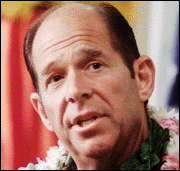

![]()
Gathering Places


![]()
Gathering Places
While in my 20s, I was mayor of Pittsfield, Mass., for two rewarding terms. It was a tough job. Many people think that mayors should be concerned only with street repairs and not with economic development or education. But having a vision for how the city needs to develop gives meaning to the day-to-day operations. University is the key to
shaping and sustaining
Hawaii’s futureTo be visionary is to be activist in its highest form because the root of all activism is hope. The heroes of the civil rights movement had a dream about America's future that lifted them from the oppression of their own times. The people who make history focus on what can be, not what is or what was.
Ralph Waldo Emerson urged us to "hitch our wagon to a star." Honolulu's guiding star is sustainability and it has five points: economy, energy, resources, land use, transportation. Sustainability is a commitment to be responsible for our 'aina. We cannot proceed as if our resources are everlasting or that a healthy economy or vibrant communities just happen.
It's not news that Hawaii's economy is overly dependent on two industries: tourism and the military. How will we encourage diversified economic development without straining our natural resources?
The answer is in the question. What forms of development don't strain resources? High-tech is one. Bio-tech is another. Both will be driven by our university, as will ocean research and technologies and diversified agriculture. These are features that can be nurtured on every island.
Developing sustainable industries will depend on our ability to make global partnerships in which the money, infrastructure and jobs all stay home. To do this, the city, state, university and private sector must work together.
The second point of our guiding star is energy. Energy usage challenges every municipality, but especially ours as an island-state. It's reckless to function as if our resources are unlimited.
We should develop policies around alternative fuels because our dependence on fossil fuels is costing us self-sufficiency and poisoning our environment. Conservation and alternative sources are only two ways to think about sustainable energy. What about recycling our cities' wastewater for agriculture?
The third point is sustainable resources. I have been visiting Hawaii for 40 years and have been struck by the fragility of social, cultural and ecological systems here. As an island, we must be hyper-vigilant about our water supply, streams and beaches, air quality, the disposal of waste. The university, the sixth largest water user in the state, takes its responsibility seriously and is developing innovative strategies for future conservation.
The viability of one part of the ecosystem is dependent on the health of every other part. The native people of Hawaii knew this; it is part of their tradition and our inheritance. It is embodied best in the concept of ahupua'a -- the mountain to ocean ecosystem that sustained those who lived on the land. Think, too, of this chain of islands as interdependent.
The fourth point is land use. On any island the challenges of responsible land use are magnified. On this group of islands, the challenges are even larger.
The time has come to stop fixating on the past because we now have the resources for solutions. Leading the way are my colleagues in the Department of Urban and Regional Planning, where I am a tenured faculty member. We need land-use policies that control sprawl and support land development that creates integrated communities in which we can live, work and play. We need to preserve open spaces because once they are gone, they are gone forever.
The fifth point is transportation. As anyone on H-1 at rush hour will tell you, our cities are clogged with automobiles.
UH planners, engineers, artists and designers recently won an international competition for their design of an electric bus powered by a hydrogen fuel cell. The "CitySurfer," a 70-foot, zero-emission electric vehicle, was the result of a true partnership.
Your university sustains all of these elements. The tradition is rooted in ancient Hawaiian culture and is at the heart of our state motto: "The life of the land is perpetuated in righteousness." I believe that "righteous" is that which improves the lives of the most people.
Honolulu can be one of the world's great cities because an enlightened government, an energized university and an engaged citizenry focused on a common vision.
Just as the only sure weapon against bad ideas is better ideas, the only remedy for cynicism is hope. Another word for hope is vision. With vision must come the capacity to sustain society educationally, environmentally and economically.
Evan Dobelle is president of the University of Hawaii.